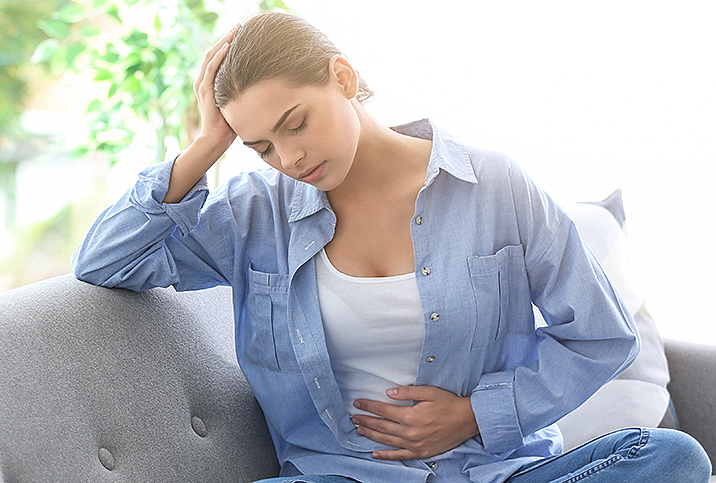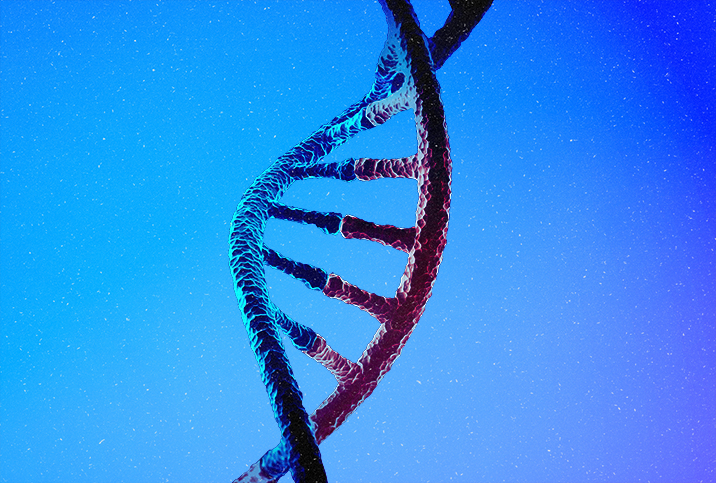A Dating Guide for People With Endometriosis

Editor's note: Some sources for this article requested their full names not be used.
Everyone wants to live the dream of a rom-com: an adorable meet-cute and a series of idyllic dates leading to a fulfilling lifelong relationship—ah, bliss. However, when you're contending with a gynecological condition plagued by a lack of research, the fairy tale may take a little work.
Endometriosis is a chronic health condition where endometrium-like tissue grows outside of the uterus in places such as the ovaries or fallopian tubes. It affects people of any age, and approximately 10 percent—190 million—of reproductive-age women and girls have it, according to the World Health Organization.
While statistics show that the condition most commonly affects cisgender women in their 30s and 40s, research into the number of nonbinary people assigned female at birth living with endometriosis is lacking.
As awareness improves, endometriosis is edging out of the darkness, empowering more people to date with the condition, not in spite of it.
What is endometriosis?
"Unless you have endometriosis, people don't understand," said Ami Bolt, 28, a copywriter and content writer from Eastleigh, England. "It's a silent condition and it's impossible to describe what it feels like, especially because there's a sliding scale of severity. Doctors shrug it off and say, 'Everyone has some endometriosis.'"
The presence of endometriosis in the pelvis or, in rarer cases, organs such as the lungs or stomach poses several complications.
"Endometriosis can affect daily life and overall quality of life because of chronic pelvic pain due to painful and/or heavy periods, painful sex, bloating, bowel involvement and urinary symptoms," said Nitu Bajekal, M.D., an OB-GYN in the United Kingdom and co-author of "Living PCOS Free." "There can be a significant psychological impact, such as stress and depression, as a result of living with the condition."
Diagnosis of endometriosis, which also affects fertility and can cause painful sex, urinary symptoms and bloating, takes a long time. The average diagnostic period is 7.5 years, according to Endometriosis UK. Wait times appear to be the result of differing presentations, a lack of education, and symptoms being dismissed by doctors as "bad periods."
"One night, I had my best friend over for a sleepover, and the [endometriosis] pain was so bad that I collapsed on the floor," Bolt said. "I screamed and screamed, and I genuinely thought I was dying. I went to the hospital, and they said I was absolutely fine and told my mum that 'Teenage girls do this sometimes, they just want attention.'"
Eventually, with the help of her mother's advocacy, Bolt was diagnosed following laparoscopic excision surgery. The surgery—the only method that guarantees a confirmed diagnosis because scans can appear deceptively clear—is one of the very few treatments available for endometriosis patients. Other options include hormone treatment, such as birth control, pain management and hysterectomy.
Life impact
"I am a divorced, single mom and never thought I would have to date again," said DaNae, a 36-year-old administrative assistant living in Lubbock, Texas. "Dealing with dating while constantly in pain is difficult. I feel unattractive many days. The weight fluctuations and swelling and pain definitely make me feel less confident and not desirable."
Living with a chronic condition affects every aspect of life. It requires a complete reassessment of how you function and often means living a life in reaction to symptoms, instead of freely choosing the next adventure.
"Chronic health conditions cause so many changes that it may make someone feel like they've lost themself," said Natalie Fraize, a licensed mental health counselor in Buffalo, New York, who specializes in chronic illness and the connection between physical and mental health.
Adapting to life with a health condition requires learning to accept its impact, even if you do not want to admit it changed anything. There is no shame in managing your condition first and not prioritizing dating. If it feels necessary, arrange dates that work for your body by avoiding activities that trigger symptoms, and reschedule if a flare-up arises.
Jade, 32, a medical summarizer who has had symptoms of endometriosis since age 12, used to feel guilty about canceling dates, but not anymore.
"That's part of living with this condition; you never know when it's going to flare," she said.
Impact on sex
"Endometriosis has affected my sexual confidence massively," said Jade, who experiences painful sex and excludes some positions during specific parts of her cycle. "In the early days, I would bleed every time I had sex."
Before partnering with someone else, figure out what works solo. Explore new positions while masturbating and get to know your body in all its forms—flares and all. Try decentering penetrative sex, which may trigger pain. Experiment with new ways to please each other with toys or erotic massages.
"Think about what and how you want to communicate to a new partner so that you have the best, safest possible experience when you're ready," Fraize advised.
Managing it
Introspection is a crucial part of living successfully with a chronic illness. Medical conditions have their own agenda, but identifying triggers and management techniques can free you up to focus on other activities that bring joy, like dating.
"The experience of chronic illness can feel out of control, but this is your chance to get your power back," Fraize said. "You get to determine how you tell your story."
Patience takes on a frustrating but necessary role in living with endometriosis and dating. We need time, and sometimes multiple attempts, to build connections with people. Maintain your boundaries and standards; everyone deserves to be with someone who respects them as a whole person, illnesses included.
"Most people don't believe or understand until they see a high-pain day or period," DaNae added. "It takes time for someone to understand the depth. Find a partner that loves you for you and will help on high-pain days. Don't assume everyone is always going to be callous. There are people out there that will understand or at least try to."
Improving education and encouraging patients to advocate for themselves has the potential to be life-changing for so many people. Although endometriosis has life-altering consequences, saying farewell to a fulfilling dating life is not one of them.
"Please know you're more than your endometriosis," Bolt said. "Sometimes it feels like this pain-in-the-arse disease rules over your life, but it is possible to live a life where it's just a part of you, rather than all of you."


















